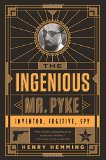Summary | Excerpt | Reviews | Beyond the Book | Readalikes | Genres & Themes | Author Bio

Inventor, Fugitive, Spy
by Henry HemmingHow to get a Job as a War Correspondent
(as an Inexperienced Twenty-Year-Old)
For many young men like Geoffrey Pyke, who had grown up in upper-middle-class Edwardian London and liked to read, the idea of being a war correspondent had a heroic and at times breathless appeal. In 1912 the journalist Philip Gibbs described it as 'the crown of journalistic ambition, and the heart of its adventure and romance'. The life of a war correspondent seemed to combine the most attractive elements of explorer, spy and best-selling author. Marinetti had been a war correspondent several years earlier in Libya, as had Churchill in South Africa, and by 1914 Pyke described himself as 'absolutely determined to be a correspondent somewhere'.
But where?
On his way back from Denmark Pyke had pored over a map of the world in the hope of finding a newsworthy spot which did not yet have a full complement of correspondents. yet whenever he found a likely destination his ambition foundered on his almost complete lack of journalistic experience. Apart from a handful of Reuters dispatches, by the age of twenty he had written no more than two short stories, a handful of book reviews, forty-two lines of doggerel and various interviews, including one with the actor Henry Lytton (then playing 'ko-ko' in The Mikado), all for the Cambridge Magazine or Mandragora, both of them parochial university publications. Nobody on Fleet Street could mistake him for a seasoned correspondent, and even they were finding it hard to get work.
The novelist Arthur Ransome, a decade older than Pyke, a Russian speaker and the author of books and numerous articles, was unable to persuade any British newspapers to take him on. Indeed, what was sometimes known as the 'Street of Adventure' had been besieged since the outbreak of war by a 'procession of literary adventurers'. There were 'scores of new men of sporting instincts and jaunty confidence, eager to be "in the middle of things," willing to go out on any terms so long as they could see "a bit of fun".' Pyke spoke no foreign language fluently, he had published no books and had left the country just twice. He did not stand a chance.
The problem appeared to be intractable, unless, that was, he could turn it upside down. Rather than look for a way past his inexperience he placed it at the heart of this puzzle. Instead of trying to identify towns or cities where there were not enough correspondents – but where there soon would be – he needed to look for a place in which correspondents would always be in short supply and where he might never face any competition.
He looked at the map afresh. No matter how long the war went on there were unlikely to be many correspondents in Reykjavik, surely. Or in Timbuktu, for that matter. 'Suddenly it came to me. We had no correspondents in Berlin. Supreme ass of all asses – of course – Berlin; the very place; no competition; no editor would say with an air of tired resignation that he was already very well served there, and had no necessity for further assistance, though of course he was very grateful, etc. etc. no difficulty at all, except of getting there, and out again.'
Geoffrey Pyke, Special Correspondent in Berlin.
His heart must have lurched at the thought. To produce a single report from the German capital would be the journalistic scoop of the war. Berlin was the last place where anyone would think to go as an English war correspondent, yet there were editors on Fleet Street who would sell their grandmothers for a stream of reliable news from the heart of the German Reich.
Of course, most of Pyke's contemporaries would have dismissed this idea as fantasy the moment it entered their minds. It was thought to be impossible to get into Germany as an Englishman, impossible to move around and impossible to get one's reports out.
Excerpted from The Ingenious Mr. Pyke: Inventor, Fugitive, Spy by Henry Hemming. Copyright © 2015 by Henry Hemming. Reprinted with permission from PublicAffairs.
Anagrams
Click Here to find out who said this, as well as discovering other famous literary quotes!
Your guide toexceptional books
BookBrowse seeks out and recommends the best in contemporary fiction and nonfiction—books that not only engage and entertain but also deepen our understanding of ourselves and the world around us.